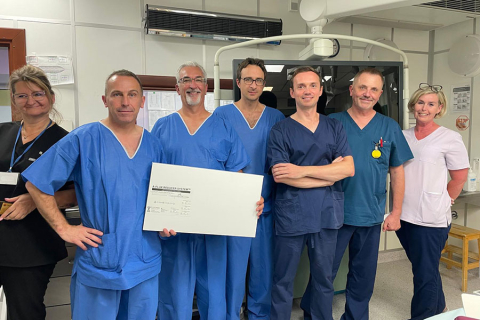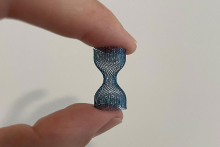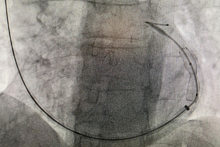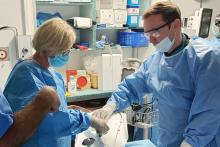The innovative reducer
The A-Flux Reducer is a device, implanted under local anesthesia, which, after implantation, leads to a gradual congestion of the previously anemic areas of the heart. The design of the state-of-the-art A-Flux Reducer System device allows it to be covered earlier by the endothelium, meaning faster healing of the vessel after implantation and thus earlier relief from angina symptoms.
The use of a new reducer in a patient with refractory angina
Angina pectoris is a symptom of ischemic heart disease, which is caused by too little oxygen being delivered to the heart through the coronary vessels. It is characterized by chest pain, which occurs, for example, in the event of stress or exertion, and can worsen the comfort of life. Among patients with angina pectoris, a relatively large group are those with microvascular disease, some of whom experience intractable chest discomfort despite optimization of drug treatment. This is known as refractory angina. Until now, the treatment options for patients with severe microvascular angina that persists despite optimal pharmacotherapy (refractory angina) have been very limited.
The specialists from the 1st Chair and Department of Cardiology MUW carried out the procedure in a patient without coronary artery stenosis, without previous interventions on the coronary arteries, in whom the presence of small vessel disease was confirmed by invasive microcirculation evaluation. The procedure proceeded without complications. The patient is feeling well and has already been discharged home, but will remain under the care of the department's team for follow-up visits to the cardiology clinic.
- According to the available studies, the coronary sinus flow reducer allows to increase the so-called total coronary reserve, which means that in case of exertion or stress, even several times more blood can flow to the heart than at rest - explains Mariusz Tomaniak, MD, PhD, from the 1st Department of Cardiology, who performed the device implantation procedure. - In patients with refractory angina, in whom persistent chest discomfort persists despite optimization of pharmacotherapy, the reducer offers a chance to improve quality of life and alleviate the symptoms.
The team performing the procedure
The procedure was conducted on July 26 by a team consisting of:
- Mariusz Tomaniak, MD, PhD, (surgeon),
- Prof. Janusz Kochman (surgeon),
- Dr. Francesco Giannini (proctor),
- Katarzyna Pałyska, Katarzyna Michalska (nurses),
- Stanisław Drozdowski (technician).
The 1st Chair and Department of Cardiology MUW is headed by Prof. Marcin Grabowski.
International study evaluating the use of the reducer in patients with refractory angina
This fall, the specialists from the 1st Chair and Department of Cardiology MUW will begin an international clinical trial (SERRA-I), which is the next step in the evaluation of this first treatment therapy using this device aimed at patients with refractory angina in the course of microvascular dysfunction. Mariusz Tomaniak, MD, PhD, from the 1st Department of Cardiology MUW, is acting as the national coordinator of the study in Poland (National PI) in this international study.



